Learn how the term 'Noel,' though not explicitly biblical, symbolizes the profound celebration of Jesus' birth and its deep-rooted historical significance.
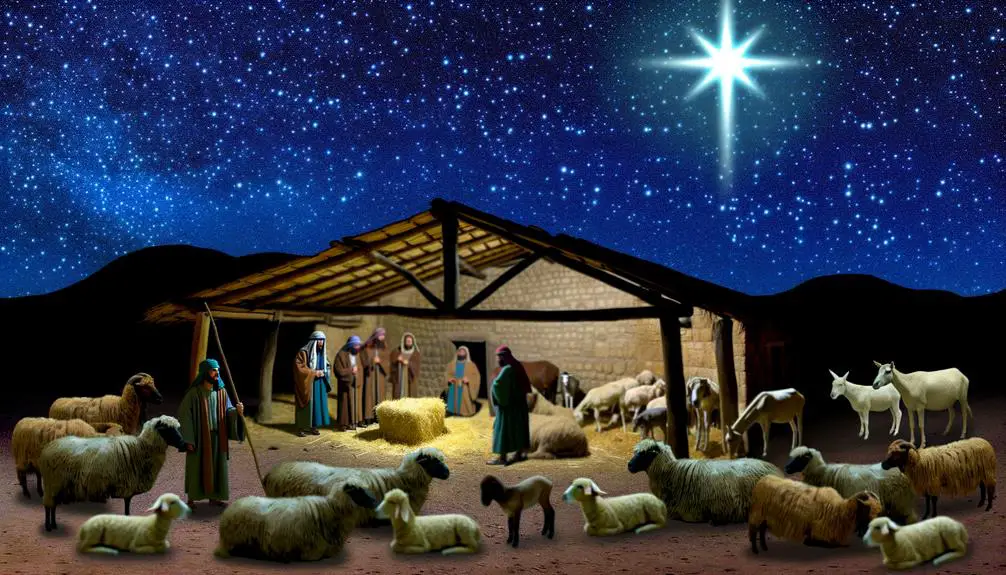
Definition of Noel in the Bible
In your exploration of 'Noel' in a biblical context, it's important to note that the term itself doesn't appear explicitly in the Bible. However, its origins from the Latin word 'natalis,' meaning 'birth,' directly connect to the theological significance of the birth of Jesus Christ. This expression has evolved, particularly through French linguistic developments, becoming synonymous with Christmas and the accompanying celebrations of Jesus' nativity. Therefore, while 'Noel' is not found in the biblical text, its spiritual essence is vividly present in the celebration of Christ's birth. Exploring further may reveal how these origins enrich the practices and beliefs surrounding Noel.
Key Takeaways
- Noel, derived from the Latin 'natalis,' meaning 'birth,' symbolizes the birth of Jesus Christ.
- The term itself is not mentioned directly in biblical texts.
- Noel embodies the spirit of the Nativity story, focusing on Jesus's birth.
- It reflects themes of divine joy and renewal present in Christian theology.
- Noel has evolved to represent broader Christmas celebrations in Christian culture.
Origins of the Word Noel
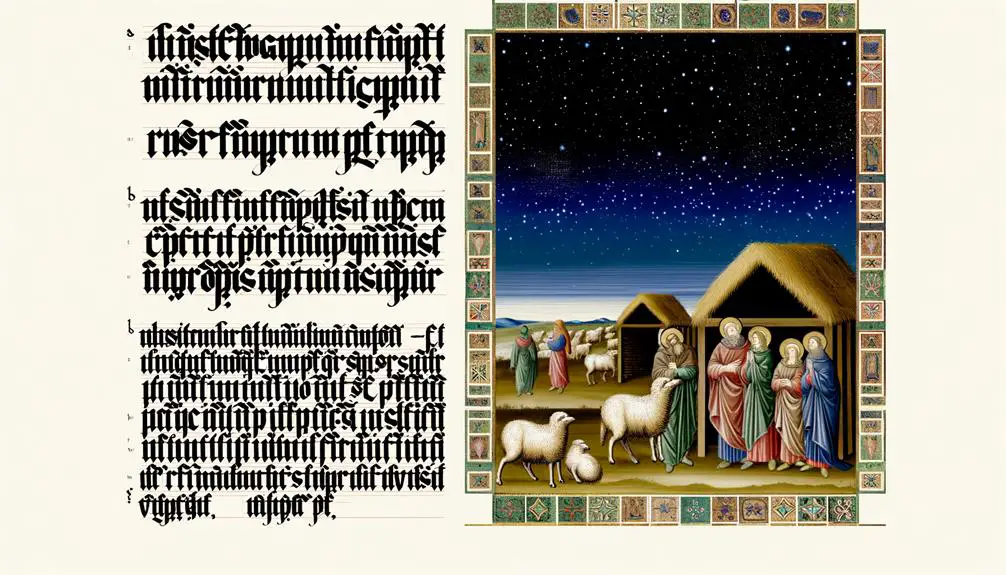
The term 'Noel' traces its origins back to the Latin word 'natalis,' which means 'birth.' This etymological root is important in understanding the deeper significance and usage of 'Noel,' particularly in historical and cultural contexts. Over time, the term underwent a transformation, primarily influenced by linguistic shifts in the French language. It's fascinating to note how 'Noel etymology' reveals the adaptability and evolution of language, especially through the lens of French influence.
As you explore further, you'll find that the French adaptation of the Latin 'natalis' to 'Noël' marked a significant linguistic milestone. This change didn't just alter the word's structure but also enriched its meaning, associating it more specifically with the Christmas season and its joyous celebrations. The French influence was pivotal, not merely in altering the word but in enhancing the cultural resonance of 'Noel.' This shift from a generic term for 'birth' to a word imbued with festive significance underlines the dynamic nature of language and culture.
Understanding 'Noel' in this light, you gain insight into how historical, linguistic, and cultural factors intertwine, shaping words that carry profound meanings across generations and geographies.
Biblical References to Noel
While investigating how 'Noel' evolved linguistically and culturally, it's also relevant to examine its appearances in biblical texts where the term underscores themes of birth and renewal. You might find it interesting to explore how the etymology of Noel, derived from Latin and French origins implying birth, resonates through the scriptural narratives that celebrate divine interventions and new beginnings.
In your study of biblical texts, you won't find 'Noel' explicitly mentioned; however, the spirit of Noel—encompassing joy, birth, and renewal—is vividly present in the accounts of nativity and other transformative events depicted in the Scriptures. For instance, the birth of Jesus, a central event that Noel celebrations highlight, echoes through various books of the New Covenant, offering a profound reflection on the themes of hope and new life.
Analyzing these sections, you'll notice how the underlying messages align with Noel's etymology. The joy and communal gatherings during Noel celebrations can be seen as a modern reflection of the biblical rejoicings over pivotal renewals in human history. Therefore, the biblical references to themes akin to Noel enrich your understanding of its deep-seated cultural and spiritual significance.
Noel in Christian Theology
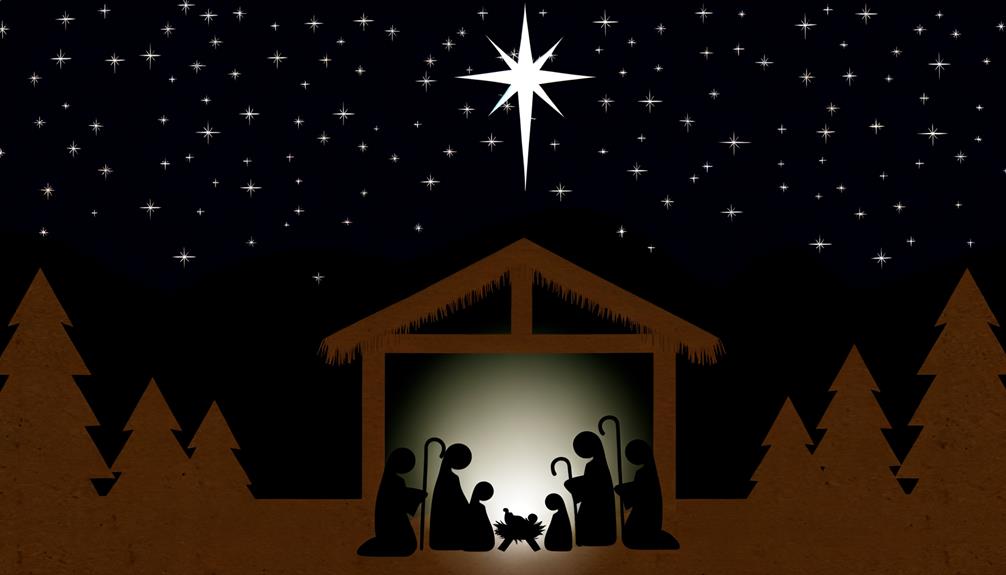
As you explore Noel in Christian Theology, it's important to ponder its Biblical significance and how this shapes its theological implications. You'll find that Noel isn't just a term for Christmas; it embodies rich theological depths that reflect on the nature of Christ's birth and its impact on Christian doctrine. By understanding these aspects, you're better equipped to appreciate the multifaceted role Noel plays in Christian celebrations and teachings.
Noel's Biblical Significance
In Christian theology, 'Noel' signifies the birth of Jesus Christ, reflecting a profound moment of divine intervention in human history. This term encapsulates not only the event itself but also the rich tapestry of Noel traditions and festive interpretations that have evolved over centuries. As you explore these customs, you'll find that they serve as both a reflection and a reinforcement of the theological significance of Christ's nativity. These practices aren't just festive; they're didactic, imparting lessons of hope, redemption, and divine love. Through carols, decorations, and liturgical acts, the story of Noel is told and retold, embedding itself deeper into the cultural and spiritual life of believers. Each element of celebration is a thread in a larger theological tapestry, illustrating the pervasive impact of this pivotal biblical event.
Noel's Theological Implications
Building on the rich traditions of Noel, it's important to explore how this term embodies profound theological implications in Christian theology. You'll discover how Noel ethics and secular interpretations interact to shape the understanding of this concept:
- Incarnation and Redemption: Noel symbolizes the birth of Jesus Christ, representing God's plan for humanity's redemption.
- Community and Unity: It encourages a spirit of unity and community among believers, reflecting the inclusive nature of God's love.
- Ethical Living: Noel ethics inspire believers to live morally upright lives, emphasizing virtues like generosity and compassion.
Understanding these elements can deepen your appreciation of Noel beyond its traditional celebrations, offering insights into its significant role within Christian theological discourse.
Cultural Impact of Noel
The cultural impact of Noel is profound, shaping traditions and celebrations across various societies. As you explore the festive period, you'll notice that Noel traditions vary widely, but they universally foster a sense of community and shared joy. In many cultures, these traditions include decorating homes, exchanging gifts, and attending special church services. Particularly, the singing of Noel music—carols that have been passed down through generations—plays a pivotal role. These carols not only enhance the festive atmosphere but also serve as a vehicle for transmitting theological themes and communal values.
Moreover, Noel's influence extends beyond the immediate festive season, affecting arts, commerce, and social customs. It's fascinating to observe how this period drives economic activity, with markets around the world bustling with holiday sales. Socially, Noel encourages a spirit of generosity and goodwill, aspects that are celebrated and reinforced in numerous cultural expressions, from literature to cinema.
Understanding these impacts helps you appreciate Noel as more than just a religious observance; it's a cornerstone of cultural identity for many, woven into the very fabric of societal life. Through this lens, the significance of Noel in shaping cultural norms and values becomes remarkably clear.
Noel and the Nativity Story
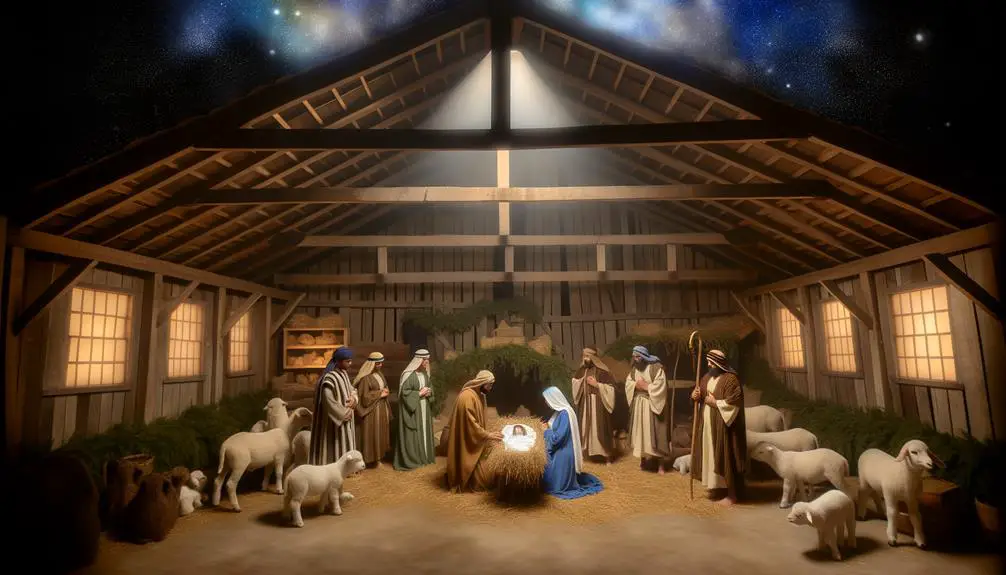
As you delve into the term 'Noel,' it's crucial to ponder its origins, which are intricately connected with the Nativity story. References to Noel in scripture underscore its importance in Christian traditions, emphasizing the birth of Jesus. Additionally, the symbolism of Noel reflects a diverse array of meanings that echo through different cultures and historical contexts.
Origins of Noel
Delving into the origins of 'Noel,' one finds its roots deeply intertwined with the Nativity story, celebrating the birth of Jesus Christ. This term, rich in historical and cultural significance, sheds light on how ancient festivities have shaped modern celebrations.
Here are three key aspects to explore:
- Noel Etymology: Originally deriving from the Latin word 'natalis,' meaning birth, it emphasizes the connection to the birth of Christ.
- Festive Traditions: Over centuries, Noel has been celebrated with various customs that blend religious reverence with communal joy.
- Cultural Evolution: The term has evolved to include a wider range of festivities, transcending its purely religious origins to encompass a broader cultural celebration during the winter season.
Understanding these elements helps appreciate Noel's deep historical and spiritual resonance.
Noel in Scripture
In exploring Noel's depiction within scripture, it's clear that the narratives of the Nativity story in the Gospels of Matthew and Luke provide foundational context for this celebration. Understanding the etymology of Noel, originating from the French word meaning 'Christmas,' highlights its deep connection to these biblical accounts. The interpretations of Noel emphasize the joy and birth of Jesus Christ, aligning closely with the scriptural messages of hope and salvation. As you investigate further, it's evident that both Gospels, though differing in details, converge on the core theme of miraculous birth, fulfilling prophecies, and bringing divine joy to the world. This alignment enriches the comprehension of Noel, anchoring it firmly within Christian theology and scripture.
Symbolism of Noel
While exploring the Nativity story, it's important to recognize how Noel symbolizes the embodiment of divine joy and hope through the birth of Jesus Christ. The story not only captures a miraculous event but also enriches our modern celebrations with layers of meaning, deeply embedded in festive traditions and Noel decorations. Here's how:
- Divine Joy: Noel heralds the joy of Christ's birth, infusing happiness into festive celebrations around the world.
- Renewed Hope: The Nativity story renews hope every year, reminding us of the promises of faith and redemption.
- Cultural Heritage: Noel decorations are not mere embellishments but carry the ancestral echoes of Christian history and the warmth of communal identity.
These elements collectively enrich the celebration of Noel, making it a profound seasonal observance.
Linguistic Evolution of Noel
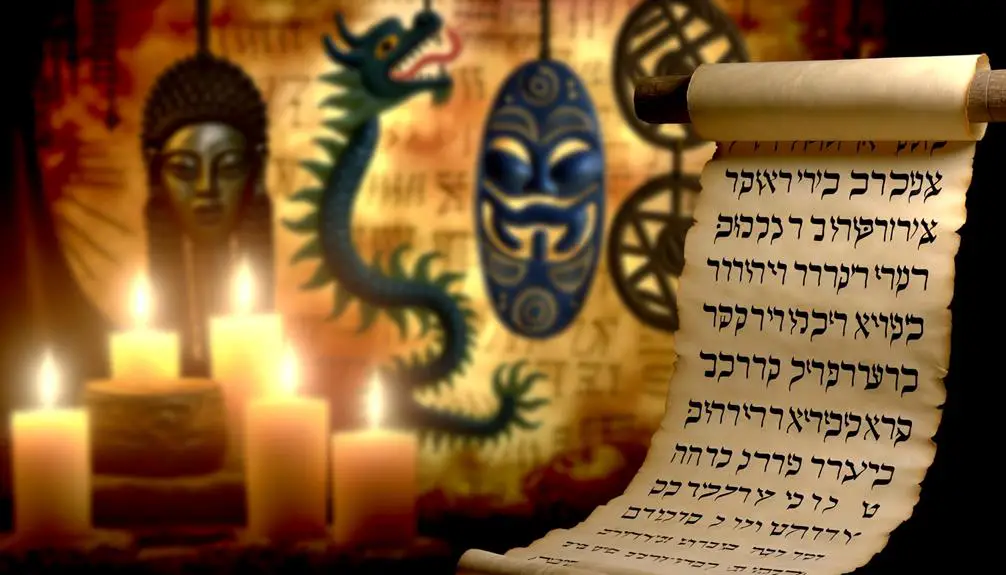
Over the centuries, the term 'Noel' has undergone significant linguistic transformations, reflecting changes in usage, pronunciation, and cultural influence. You'll find its roots fascinating, as they illustrate a journey through languages and cultures that have shaped its current form and meaning. The Noel etymology traces back to the Latin word 'natalis', meaning 'birth'. This term evolved through Old French, becoming 'noël', which refers to the Christmas season. The shift from a Latin base to a vernacular French term showcases how language origins mold the words we use today.
As you explore further, you'll notice that 'Noel' isn't just a static term fixed in the lexicon of Christianity; it's a vibrant example of linguistic evolution. Each cultural adoption and adaptation have left imprints on its usage, altering its phonetic components and semantic fields. It's important to appreciate how these changes are indicative of broader socio-cultural shifts over time. Understanding this development helps you grasp not only the linguistic aspects but also the cultural significance that 'Noel' carries, making it a term that resonates with joy and celebration across various cultures and eras.
Noel in Modern Christianity
Modern Christianity's embrace of 'Noel' reflects its enduring significance as both a religious and cultural celebration. As you explore the Noel celebrations of today, you'll find that they are deeply rooted in traditions that blend the ancient with the contemporary. This fusion shapes how communities commemorate the birth of Jesus Christ, emphasizing unity and shared joy.
To understand the depth of Noel in modern Christianity, consider the following aspects:
- Church Services: Special services are held on Christmas Eve and Christmas Day, which often include readings from the Bible, carol singing, and nativity plays. These services are central to Noel celebrations, deeply embedding the story of Christ's birth in the consciousness of the faithful.
- Community Outreach: Many Christian communities engage in outreach programs during the Noel season. This includes distributing food and gifts to the less fortunate, reflecting the spirit of giving and compassion that is at the heart of the season.
- Home and Family Traditions: From Advent calendars to the lighting of candles, Christian families incorporate various Noel traditions that emphasize preparation for and celebration of the nativity of Jesus.
These elements highlight how Noel remains a pivotal time of reflection, celebration, and action within modern Christianity, inviting you to look beyond the commercial and see the spiritual and communal resonance of these traditions.
Frequently Asked Questions
How Do Non-Christians Perceive the Concept of Noel?
You might view Noel with cultural curiosity, appreciating its festive nature while adapting the holiday's elements to fit your own traditions or beliefs, analyzing its impact without necessarily sharing its religious origins.
Are There Any Specific Noel-Related Prayers?
Are you exploring Noel symbolism through prayer? Various Noel-related prayers reflect diverse cultural interpretations, blending traditional elements with unique, local practices to create a rich tapestry of spiritual expression during the holiday season.
What Are Common Misconceptions About Noel?
You might think Noel purely stems from Western traditions, but it's often a mix, sometimes misunderstood as cultural appropriation. Its origins are diverse, blending various winter celebrations from different cultures and histories.
How Does Noel Influence Contemporary Music and Art?
Noel symbolism enriches contemporary music and art, weaving through artistic interpretations like a thread in a tapestry. You'll find its influence subtly shaping themes and inspiring a rich tapestry of cultural expression.
Can Noel Celebrations Be Traced in Non-Western Cultures?
Yes, you can trace Noel celebrations in non-western cultures, reflecting global integration and cultural adaptations. These adaptations showcase how diverse societies interpret and incorporate such festivities into their unique cultural frameworks.


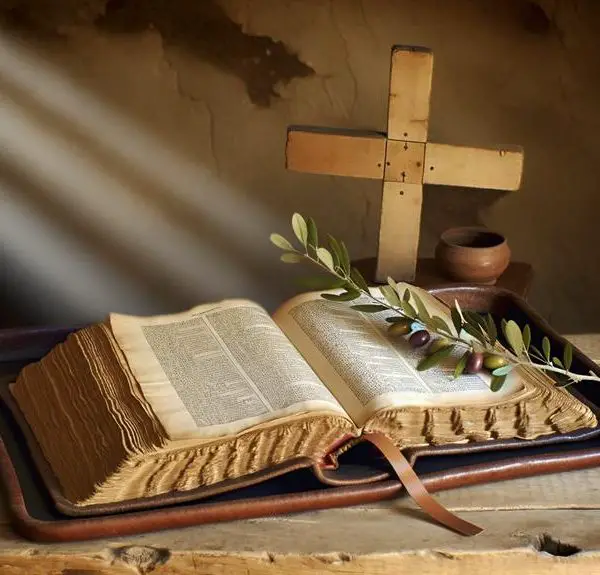
Sign up